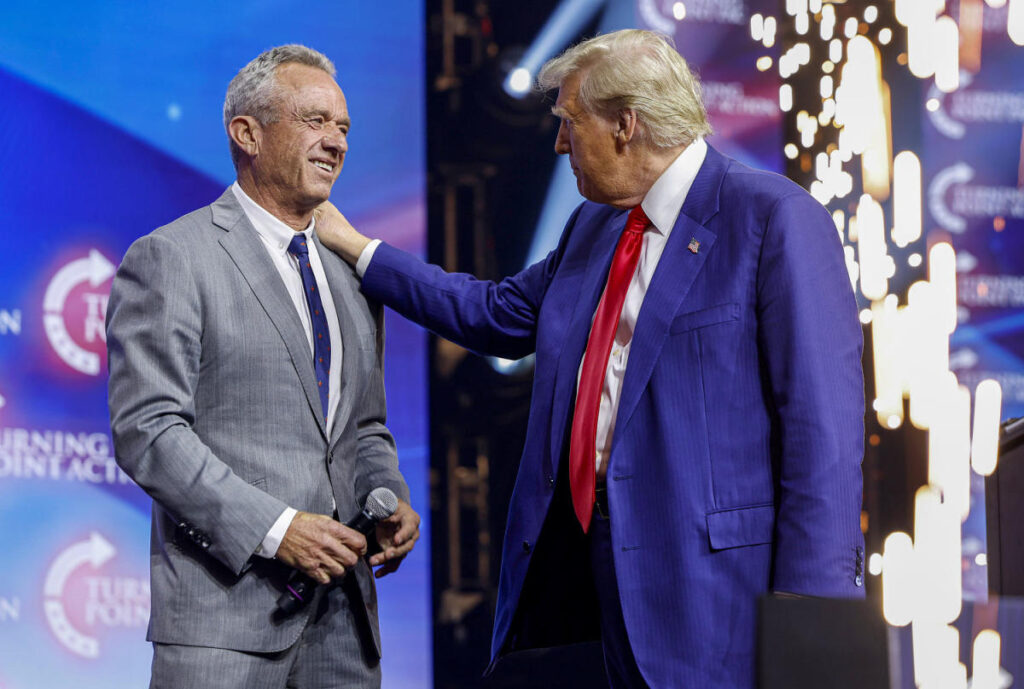In the waning days of the presidential campaign, former President Donald Trump has begun to embrace and amplify anti-vaccine rhetoric, aligning himself with the views of Robert F. Kennedy Jr., a well-known vaccine skeptic. Trump praised Kennedy in a recent NBC News interview, remarking, “He’s a great guy. I’ve known him a long time.” Trump’s growing support for Kennedy suggests that the latter might play a significant role in a hypothetical Trump administration, particularly concerning health policy. Despite vaccine misinformation not being a central theme of Trump’s campaign so far, Kennedy’s influence is gaining traction amid Trump’s push to connect with the skeptical voters who question vaccine efficacy and safety.
Trump’s support for Kennedy blossomed during an event with Tucker Carlson in Arizona, where he indicated he would grant Kennedy significant authority to examine vaccines and pesticides in an administration’s health policy framework. Trump’s remarks affirmed that Kennedy could have “carte blanche” to pursue his interests and suggested that health issues, especially women’s health, would be a priority under Kennedy’s oversight if Trump were to be elected again. Trump’s overtures have drawn sharp criticism from political opponents, including Vice President Kamala Harris, who argued that Kennedy’s promotion of “junk science” disqualifies him from influencing healthcare decisions in the U.S.
Republican vice presidential nominee JD Vance also weighed in, expressing concerns regarding the COVID-19 vaccine during a podcast interview with Joe Rogan. Vance claimed to have been quite ill after receiving the vaccine, describing the experience as “the sickest I have been in the last 15 years.” He noted an unusual skepticism about discussing vaccine side effects and highlighted his contrasting experiences with various COVID-19 infections. While Vance’s account raises eyebrows, medical experts point out that his experience is not representative of common vaccine reactions and that the risk of severe illness from COVID-19 outweighs potential side effects from vaccination.
Kennedy’s skepticism and rhetoric regarding vaccines closely mirror those held by Trump and Vance. The claims made by vaccine skeptics have been widely debunked by scientific research, which consistently shows that the COVID-19 vaccines are safe and effective at reducing severe illness and hospitalization. In 2021, the Centers for Disease Control and Prevention (CDC) characterized the situation as a “pandemic of the unvaccinated,” underscoring the high risks unvaccinated individuals face compared to their vaccinated counterparts. Despite prevailing scientific consensus, Trump and Vance appear willing to gamble on the popularity of anti-vaccine sentiment as they seek to rally voters aligned with these views.
As their campaigns have unfolded, both Trump and Vance have increasingly embraced Kennedy, with him recently suspending his independent presidential bid to endorse Trump. He has since joined the campaign trail to rally his followers in support of Trump, reinforcing his stance on health authority within the potential administration. Kennedy has publicly claimed that Trump has promised him control over critical public health agencies like the Department of Health and Human Services. Such a prospect has raised concerns over the empowerment of anti-vaccine narratives in governance, particularly in agencies that guide public health policy.
In the wake of escalating support for concerted anti-vaccine views, Trump’s campaign denoted that no formal positions have been designated yet; however, they emphasized Kennedy’s potential role in shaping health policy for a future administration. Trump’s previous endorsement of “Operation Warp Speed” stands in contrast to his current association with figures like Kennedy, who advocate for hesitant views on vaccinations. Kennedy himself has articulated that individual vaccine choice should be respected, yet he insists on a fundamental understanding of risks associated with vaccine intake. The intersection of political ambition and public health policy looms large in the current campaign context, indicating a potential shift in public health governance if Trump were to return to office.

